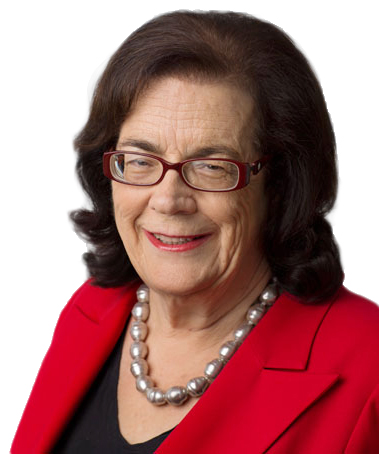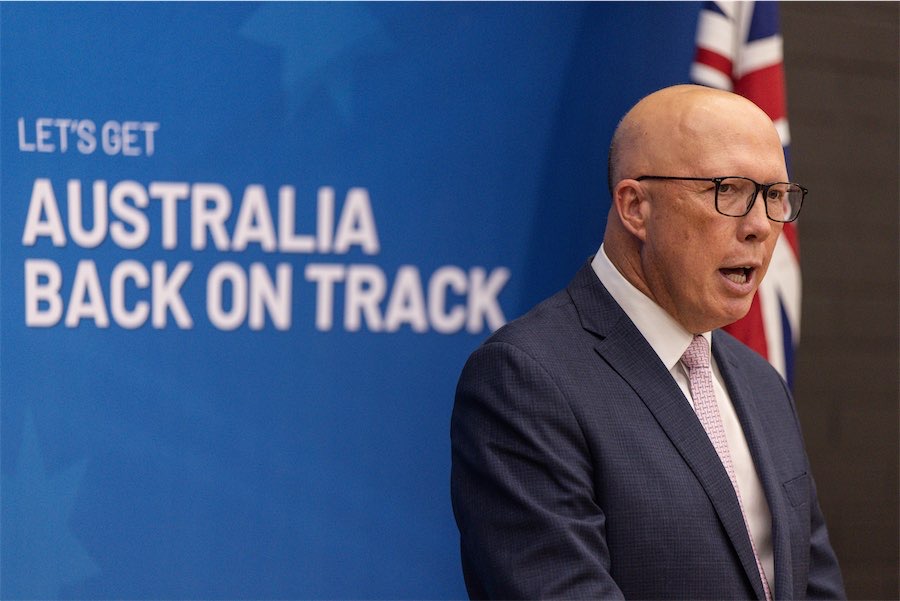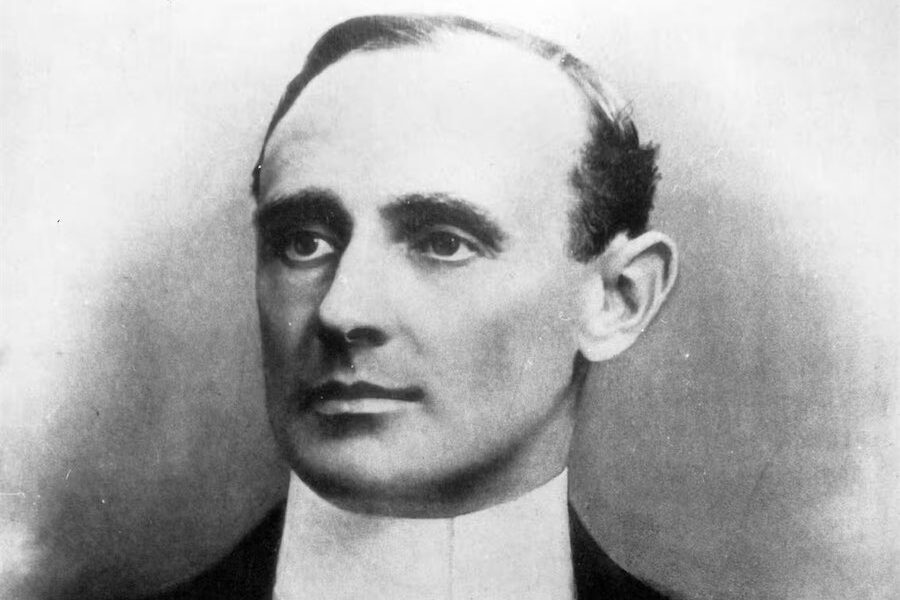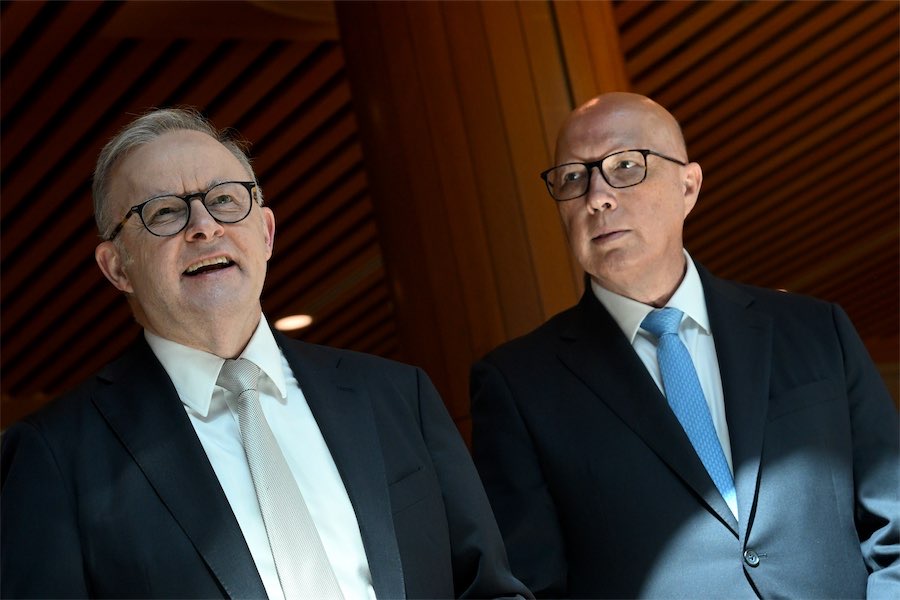After the deal on security, Prime Minister Scott Morrison turns to the shift on climate, writes political columnist MICHELLE GRATTAN.
ONE is tempted to think Prime Minister Scott Morrison’s hero must be Harry Houdini, the great escape artist. Put our prime minister in a corner, and he will talk his way out, or try to.

After President Biden rang President Macron this week to soothe hurt French feelings about AUKUS, a joint statement was issued.
It said in part: “The two leaders agreed that the situation would have benefited from open consultations among allies on matters of strategic interest to France and our European partners.”
Morrison refused to take this as any reflection on Australia’s diplomatic blundering in the way it handled the cancellation of its French submarines contract.
“They were dealing with different issues to Australia,” he argued. “The United States and France are NATO countries. And there are certain expectations amongst NATO partners about how they’re engaged with each other on national security issues.”
On any “trust” metric, Morrison has received a battering since the AUKUS announcement. An angry Macron is not yet willing even to accept his call.
But the Prime Minister probably won’t be too worried in domestic political terms. He’ll think the main takeout by his “quiet Australians” will be not that the French are accusatory, but that a big new deal is delivering nuclear-powered subs and other weaponry to protect against the Chinese, about whom polling shows people are increasingly worried.
Morrison might have been more disappointed that with AUKUS he didn’t manage to immediately wedge Labor. In other times, the Labor left would have been screaming about nuclear boats. But Anthony Albanese, determined to stay a small target, acted with lightning speed to have the opposition back in the agreement.
Albanese, however, will have to be watchful. As Labor frontbenchers started to ask about detail and proposed a Senate inquiry, Morrison quickly said, “If the Labor Party wants to have an each way bet on national security, the Australian people need to know that”. It was a campaign line.
It’s perfectly reasonable to pursue information about an agreement for which we have bones but no flesh, but Morrison will be ruthless in exploiting legitimate opposition probing.
Morrison’s behaviour towards the French, and his refusal to admit the government deceived them, invites broader questions about trust. It’s always an issue but domestically there are some checks. Put bluntly, while dudding foreigners might be reprehensible, doing it to voters can be downright dangerous, as various politicians have learned the hard way.
When Morrison arrives back from the US, his attention will turn to executing a policy shuffle that’s important for him both internationally and electorally.
The Glasgow climate conference is only weeks away and for it Morrison needs, at the least, to firmly embrace the 2050 net zero target and present a pathway that has credible medium term markers.
Biden and British PM Boris Johnson, who’ve delivered AUKUS to Morrison, have been twisting his arm very hard to improve Australia’s climate ambition, and he needs to deliver.
The Nationals will be paid off, and Barnaby Joyce will have to cope with whatever dissent there is within his ranks. When, as acting PM, Joyce appeared on 7.30 on Thursday, he sounded like he knew he had to lock in with Morrison but wished he didn’t.
In a speech to be delivered on Friday Treasurer Josh Frydenberg is preparing the way for the shift from the present government line of reaching net zero emissions “preferably” by 2050 to the firm commitment.
Frydenberg warns if Australia is seen as a laggard on climate policy, the inflow of the capital – its cost and availability – will be hit, with consequences for everything from home interest rates to infrastructure projects.
“Australia has a lot at stake. We cannot run the risk that markets falsely assume we are not transitioning in line with the rest of the world,” Frydenberg says.
He also says the transition must be broad based with “investment in emissions reduction strategies across all sectors, be it agriculture, mining, manufacturing, and others”.
Moreover he directly takes on hardliners within the Nationals by declaring “it is wrong to assume that traditional sectors, like resources and agriculture, will face decline over the course of the transition. To the contrary, many businesses in these sectors are at the cutting-edge of innovation and technological change.”
The government is now walking quite fast rhetorically. Precisely how far it will go in policy remains to be seen.
The position for Glasgow will become the government’s policy for the election, and Albanese won’t credibly be able to hold off much longer in producing Labor’s alternative. It will be a fine judgement for the opposition leader where that policy should be pitched. He will want it some distance from the government’s, but not far enough to dangerously increase Labor’s exposure.
Meanwhile the nation and its leaders, federal and state, are bracing for another sort of transition, which could be hellish. NSW and Victoria are preparing to open (at varying rates), and this is expected to send COVID cases soaring.
There’ll be severe pressures on hospitals in those states, and an increase in deaths. Morrison and NSW premier Gladys Berejiklian hope people will be so glad to be out of lockdown they’ll pay less attention to whatever health disasters might unfold.
The sniping between leaders won’t let up, as Western Australia and Queensland continue to attempt to keep COVID from invading, and their critics rail against border shut outs.
We could be headed into some of the most uncertain and difficult days of the pandemic, with fresh tests of community cohesion and resilience.
This week, in Melbourne’s serial protests, we saw how COVID can bring out the toxic underbelly of our society. Construction workers angry about compulsory vaccinations for the industry and then its shutdown, anti-vaxxers, and thugs from the extreme right came together in a menacing mob.
The recent growth of the extreme right (which ASIO has warned about) is particularly disturbing, because these people can exploit troubled times. Nevertheless, appalling as the protests have been, they should be kept in perspective. We’ve seen thuggery before (remember the 2006 violence in Melbourne against a G20 finance ministers meeting) although it is more dangerous when it comes in a crisis.
With rising vaccination rates and the planned openings, the new year holds promise. On the other hand, with the unpredictability of covid, no one can be sure. Certainly not Morrison, as he works on his election strategy.
Michelle Grattan is a professorial fellow at the University of Canberra. This article was originally published on The Conversation.
Who can be trusted?
In a world of spin and confusion, there’s never been a more important time to support independent journalism in Canberra.
If you trust our work online and want to enforce the power of independent voices, I invite you to make a small contribution.
Every dollar of support is invested back into our journalism to help keep citynews.com.au strong and free.
Thank you,
Ian Meikle, editor




Leave a Reply